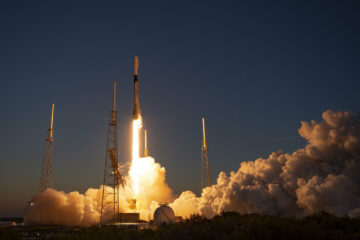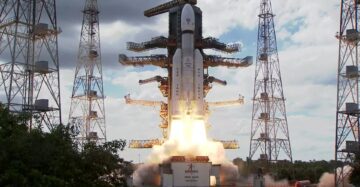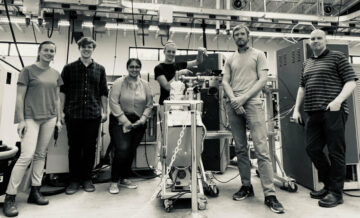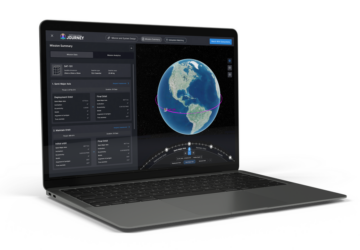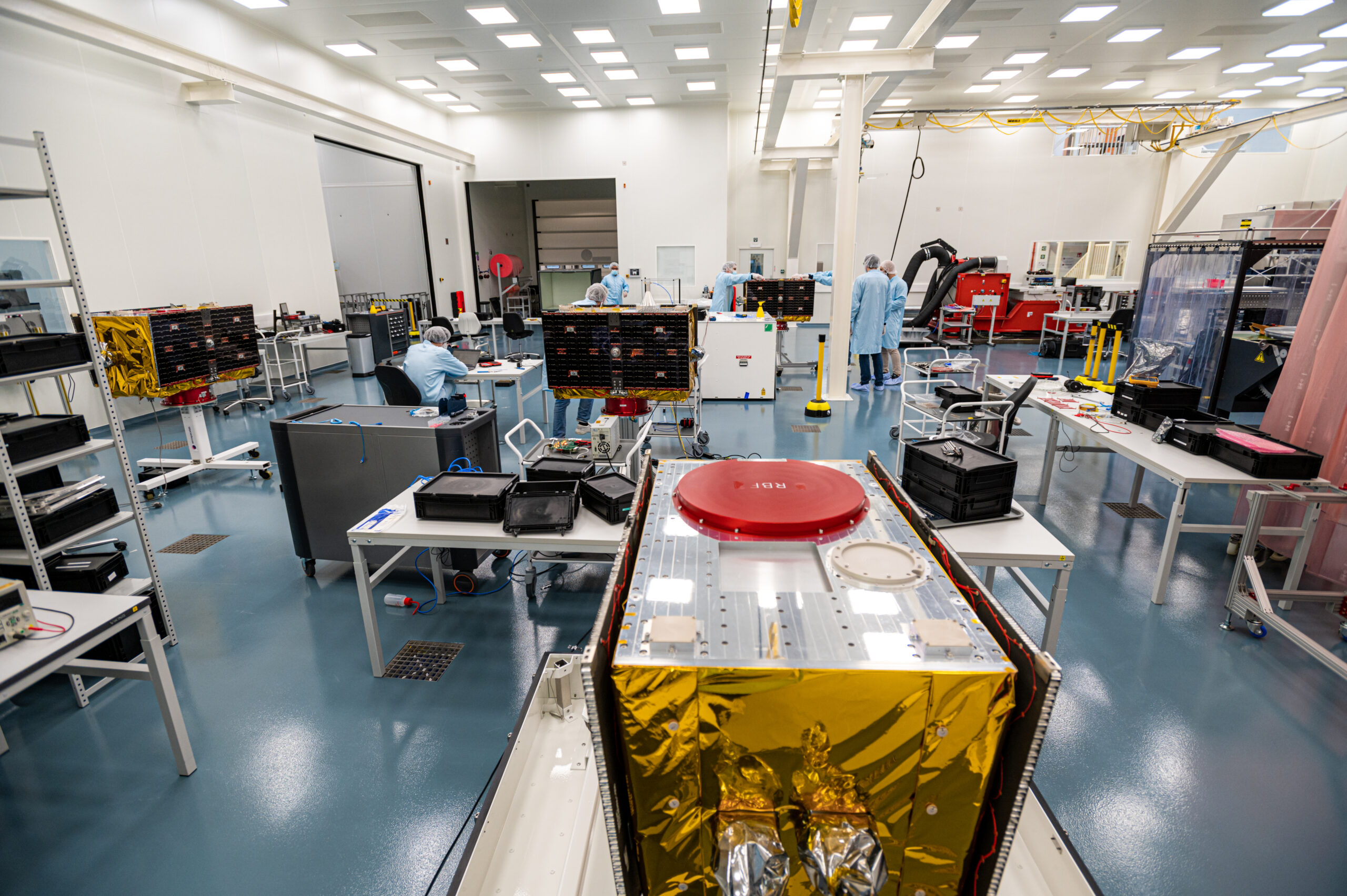
TAMPA, Fla. — Six-year-old European small satellite maker Aerospacelab has bought AMOS, a Belgian company that has provided optics for spacecraft and ground-based telescopes for more than four decades.
The companies did not disclose financial details in their April 15 announcement, but Aerospacelab chief strategy officer Tina Ghataore said the deal expands its workforce from around 200 to 330 people, mainly across Belgium, France and Switzerland.
The acquisition comes two years after Aerospacelab raised around $46 million from venture capitalists to build out a vertically integrated satellite manufacturing and operating business.
Ghataore said AMOS — or Advanced Mechanical and Optical Systems — adds critical capabilities across space and ground systems.
Space projects AMOS has worked on include polishing mirrors for ESA’s dark matter hunting space observatory Euclid and providing multispectral instruments for the agency’s Sentinel Earth observation satellite program.
AMOS is also providing expertise and hardware for the European Southern Observatory’s Extremely Large Telescope (ETL), which would measure 39 meters across when completed toward the end of the decade.
Ghataore joined Aerospacelab in August as chief strategy and revenue officer and CEO of the company’s recently opened U.S. branch. She was previously chief commercial officer for the U.S. division of Germany-based Mynaric, which provides optical technologies for communications.
AMOS’ “expertise in large very sophisticated telescopes for astronomy and other science missions also positions Aerospacelab to address space-to-ground optical communications markets,” Ghataore said, “which will become critical as we see the deployment of space optical communication terminals.
“The deep capabilities in precision larger mirrors for telescopes that AMOS brings is key to this.”
Expanding capabilities
Being vertically integrated across key bus platform avionics allows Aerospacelab to “control our development timelines, innovate, and pass through value to our end customer,” Ghataore said via email.
The biggest satellites Aerospacelab has deployed to date are in the 150-kilogram class and capable of one kilowatt of peak power, although the company has plans for more powerful spacecraft as big as 700 kilograms.
According to Ghataore, satellites deployed to date have been a mix of Aerospacelab technology demos and remote sensing customer payloads for the European Space Agency and Swiss Ministry of Defense.
In March, Aerospacelab secured a contract to build its first positioning, navigation and timing satellite in a deal for Xona Space, a Californian startup seeking to provide a commercial alternative to GPS.
Xona is providing the payload for this satellite in time for a 2025 launch, which Ghataore said would also be Aerospacelab’s first payload in orbit for a commercial customer.
Aerospacelab will build the satellite platform in a U.S.-based factory that the company aims to bring online in the next six to nine months, she added, although the exact location has not been announced.
Expanding production
Aerospacelab’s other U.S. customer is Albedo, a remote-sensing startup planning to establish an optical and thermal imaging constellation in very-low Earth orbit.
Ghataore said Aerospacelab is “delivering a full suite of avionics subsystems to them, but they will determine [the] launch timeline.”
Aerospacelab’s current manufacturing facility in Ottignies-Louvain-La-Neuve, Belgium, is designed to produce as many as 24 satellites per year.
However, Aerospacelab plans to open up a second Belgian facility next year roughly 40 kilometers away that would be large enough to produce 500 satellites annually.
Together with the AMOS acquisition, Ghataore said this “megafactory” factory would position Aerospacelab as one of the largest satellite manufacturers in Europe.
Aerospacelab investors include the venture capital arm of European space giant Airbus, which co-led its Series B funding round in 2022.
- SEO Powered Content & PR Distribution. Get Amplified Today.
- PlatoData.Network Vertical Generative Ai. Empower Yourself. Access Here.
- PlatoAiStream. Web3 Intelligence. Knowledge Amplified. Access Here.
- PlatoESG. Carbon, CleanTech, Energy, Environment, Solar, Waste Management. Access Here.
- PlatoHealth. Biotech and Clinical Trials Intelligence. Access Here.
- Source: https://spacenews.com/smallsat-maker-aerospacelab-snaps-up-optical-technology-specialist/
- :has
- :is
- :not
- $UP
- 15%
- 200
- 2022
- 2025
- 24
- 39
- 40
- 500
- 700
- a
- acquisition
- across
- added
- address
- Adds
- advanced
- After
- agency
- aims
- Airbus
- allows
- also
- alternative
- Although
- an
- and
- announced
- Announcement
- April
- ARE
- ARM
- around
- AS
- astronomy
- AUGUST
- away
- b
- BE
- become
- been
- Belgium
- Big
- Biggest
- bought
- Branch
- bring
- Brings
- build
- bus
- business
- but
- capabilities
- capable
- capital
- capitalists
- ceo
- chief
- class
- comes
- commercial
- Communication
- Communications
- Companies
- company
- Company’s
- Completed
- contract
- critical
- Current
- customer
- Dark
- Dark matter
- Date
- deal
- decade
- decades
- deep
- Defense
- Demos
- deployed
- deployment
- designed
- details
- Determine
- Development
- DID
- Disclose
- Division
- earth
- end
- enough
- establish
- Europe
- European
- European Space Agency
- exact
- expands
- expertise
- extremely
- Facility
- factory
- financial
- Financial details
- First
- fla
- For
- four
- France
- from
- full
- funding
- giant
- gps
- Ground
- Hardware
- Have
- HTTPS
- Hunting
- Imaging
- in
- include
- innovate
- instruments
- integrated
- Investors
- ITS
- joined
- jpg
- Key
- kilometers
- Kilowatt
- large
- larger
- largest
- launch
- location
- mainly
- maker
- Manufacturers
- manufacturing
- many
- March
- Markets
- Matter
- measure
- mechanical
- million
- ministry
- missions
- mix
- months
- more
- Navigation
- next
- nine
- observation
- observatory
- of
- Officer
- on
- ONE
- online
- open
- opened
- operating
- optical
- optics
- or
- Orbit
- Other
- our
- out
- pass
- Peak
- People
- per
- planning
- plans
- platform
- plato
- Plato Data Intelligence
- PlatoData
- position
- positioning
- positions
- power
- powerful
- Precision
- previously
- produce
- Program
- projects
- provide
- provided
- provides
- providing
- raised
- recently
- remote
- revenue
- roughly
- s
- Said
- satellite
- satellites
- Science
- Second
- Secured
- see
- seeking
- Series
- Series B
- she
- SIX
- small
- sophisticated
- Southern
- Space
- spacecraft
- specialist
- startup
- Strategy
- suite
- Swiss
- switzerland
- Systems
- Technologies
- Technology
- telescope
- telescopes
- terminals
- than
- that
- The
- their
- Them
- thermal
- they
- this
- Through
- time
- timeline
- timelines
- timing
- tina
- to
- toward
- two
- u.s.
- value
- venture
- venture capital
- vertically
- very
- via
- was
- we
- when
- which
- will
- with
- worked
- Workforce
- would
- year
- years
- zephyrnet

